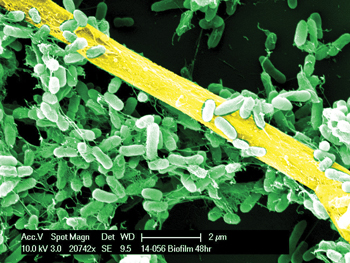Genes, environment hold the keys to healthy aging
Living into one's centenarian years involves a little bit of genetic luck, and a lot of healthy lifestyle choices.
A chance encounter with two active centenarians led Thomas Perls, MD, MPH, FACP, to his life's work: the study of longevity and healthy aging. Dr. Perls, a professor of medicine and geriatrician at Boston University School of Medicine and Boston Medical Center in Boston, is the founding director of the New England Centenarian Study, which began in 1995 and is currently the largest study of people 100 years of age and older in the world. Originally started to look at predictors of Alzheimer's disease, its main goal now is investigating why some people live to, and thrive at, advanced ages, while others do not. Dr. Perls spoke to ACP Internist about his inspirations for longevity research, some of his most interesting findings, and what internists can do to help their patients age well.
Q: How did you get interested in this area of research?
A: I was in the midst of my geriatrics fellowship at Harvard looking for a research project and was taking care of a panel of older patients, and lo and behold two of them happened to be over the age of 100. Not only was it fortuitous that I had two centenarians, but unusually, they were actually in very good shape. They were never in their rooms for me to go see them. One was always playing piano for the residents elsewhere. The other had been a tailor all his life, and he was down in occupational therapy mending people's clothes and teaching people how to sew. When he wasn't doing that, he was dating his 85-year-old girlfriend. These two kind of caused an epiphany and were so very different from what I had expected. If they had been very ill and on death's doorstep, the idea of looking more into this would have never occurred to me.

Scientific conventional wisdom at the time was that the older you get, the sicker you get, and the higher your risk for Alzheimer's disease; it was thought that certainly by the time you get to 100, everybody must have Alzheimer's. These two [patients] were certainly proving to me that this was not the case. My initial idea was to find more centenarians to see if they were like these other two. Could they possibly be a human model of resistance to Alzheimer's disease? That was really what started the study. I began to learn how to find centenarians and recruit as many of them as possible, with research support along the way from various organizations like the Alzheimer's Association, and then later, pretty much ever since, the National Institute on Aging.
Q: What have been some of your most striking findings?
A: About 45% of the centenarians, if they live to about 100 to 102, have age-related disease even before the age of 80. We call that group "survivors," that is, survivors with disease. Another 40% or so are what we call "delayers," or people who've had age-related diseases at the age of 80. And then we have the "escapers," about 15%, who have no age-related diseases at 100. And that may not sound so great, but about 90% of the centenarians were living independently up to their early 90s. From those observations, we came away with this not really being "The older you get, the sicker you get," but we think it's "The older you get, the healthier you've been," a much more optimistic, enabling, and I believe realistic view of aging.
Q: What are the most important factors in healthy aging?
A: In our centenarian study, we observed this compression of disability, where the study participants are compressing the time they're experiencing disability toward the end of their lives. We think some of it is genetics, and we think some of it is health-related behaviors. Other studies show that about 70% of the variation in how old people live to be in their late 80s is going to be due to their health-related behaviors and about 30% is genes.
For example, in the Seventh-Day Adventist Health Study, the average life expectancy was about 86 for men and 89 for women, but like the centenarians, most of these individuals are living independently for the vast majority of their lives. The Adventists have the highest average life expectancy of any very large group I know of yet they're very diverse ethnically and geographically. But what they do have in common is a religion that asks their devotees to be very healthy: They don't smoke, they don't drink, they regularly exercise, they're vegetarian, and as a result of being vegetarian and eating modestly they tend not to be obese. And so it makes sense actually that they're living to the ages that they are.
What that says to me is that the vast majority of what they have in common, that's enabling them to get to these ages, are these behaviors. That also indicates to me that if they, and actually we, all have this average set of genes and average immune systems, it's quite remarkable in terms of what they're capable of … living almost 30 years beyond the age of 60. The trick is you have to take advantage of those genes with healthy behaviors and not fight them with unhealthy behaviors such as smoking, having diets conducive to obesity, lack of exercise, excessive alcohol use, and so on. It makes intuitive sense that the people with these latter behaviors die prematurely in their 60s and 70s. They're fighting their genes and not taking advantage of them.
Q: What about living beyond age 100?
A: By the time you get to about 106 or so, we think the relative importance of genes versus behavior becomes reversed. It's more like 70% genetic and 30% health-related behaviors in terms of the influence on the variation in getting to those most extreme ages. And of course these people are very, very rare: About 1 per 5,000 is 100 years old in the United States and more like about 1 per 250,000 gets to be about 105 and 1 per 5 million is 110 or older. The numbers dramatically fall off.
We don't think that it's a single gene, some kind of "fountain of aging well" gene. Aging is a very complex process with many biological mechanisms contributing to how and why we age. It would make sense that if there's a way to slow down aging, there's going to have to be a way to impact on these many different biological mechanisms, and that would also mean many different genes.
Q: What does your research say about that?
A: What we have found is that indeed it is many genes, but each one of them has a very very modest effect on longevity, and it's getting the right combination that makes it rare. So it could be 200 or more genes with variations associated with longevity and it's a bit like winning the lottery. Getting a few of those genes in the right combination is not so difficult, but getting a bunch of them is very difficult. That's why getting to these most extreme ages, we think, is so incredibly rare.
Q: What is the utility in studying people who live to be older than 100?
A: Discovering these biological mechanisms might lead to discovering therapeutic strategies that mimic what is naturally occurring in these centenarians to decrease risk for age-related disease, especially something like Alzheimer's disease.
Another relates to the growing field of personal genomics and personalized medicine. Knowing what disease-associated genetic variants a person has has proven to not be very helpful so far. There are a few exceptions, like the BRCA1 gene for breast cancer, but for chronic age-related illnesses, discovering disease-associated genes has not been all that fruitful in terms of screening or even development of medications.
I think the reason is that people are missing half the picture. They don't know what the longevity-associated variants are that could be countering the effect of the disease-associated variants. In fact, we have found, along with a couple of other groups, that centenarians have just as many disease-associated variants as the general population. And the only reason I can think of for why they're not getting these various diseases, just like why a lot of people in the general population don't get them, is because they have some other protective genes that counter the effects of the bad genes.
Unless you know the whole picture, not only what disease genes people have but also what longevity genes people have, you're not going to get a handle on what their true risk is. By doing a lot more work on discovering specific longevity-associated genes or protective genes, I think we'll begin to get a much better understanding of these gene-gene and gene-environment interactions.
Q: For primary care physicians considering this research, what are some key factors to keep in mind to help their patients age better?
A: First of all, and they've already heard this, never, ever, ever make a clinical decision based upon a person's age alone. Whether you're going to put a pacemaker in somebody or fix their knee, I don't ever want to hear somebody say, "We're not going to do anything. What do you expect for your age?" Because I can tell them about a whole bunch of centenarians who are doing very well. Therapeutic decisions really must be made based upon goals and what a person's functional status is, not age alone.
Also, counseling people to ensure healthy diets, to exercise, even at these older ages, has benefits. For example, growing muscle is still very possible at very old ages, and the benefit of strength training helps you not fall, it even improves your cognitive function, it helps burn fat much more efficiently, it helps you manage diabetes better, so strength training is very important. Most studies will also show you that even if people are still smoking at older ages, it still pays off to stop smoking. Healthy behavior interventions remain very important even at older ages.




